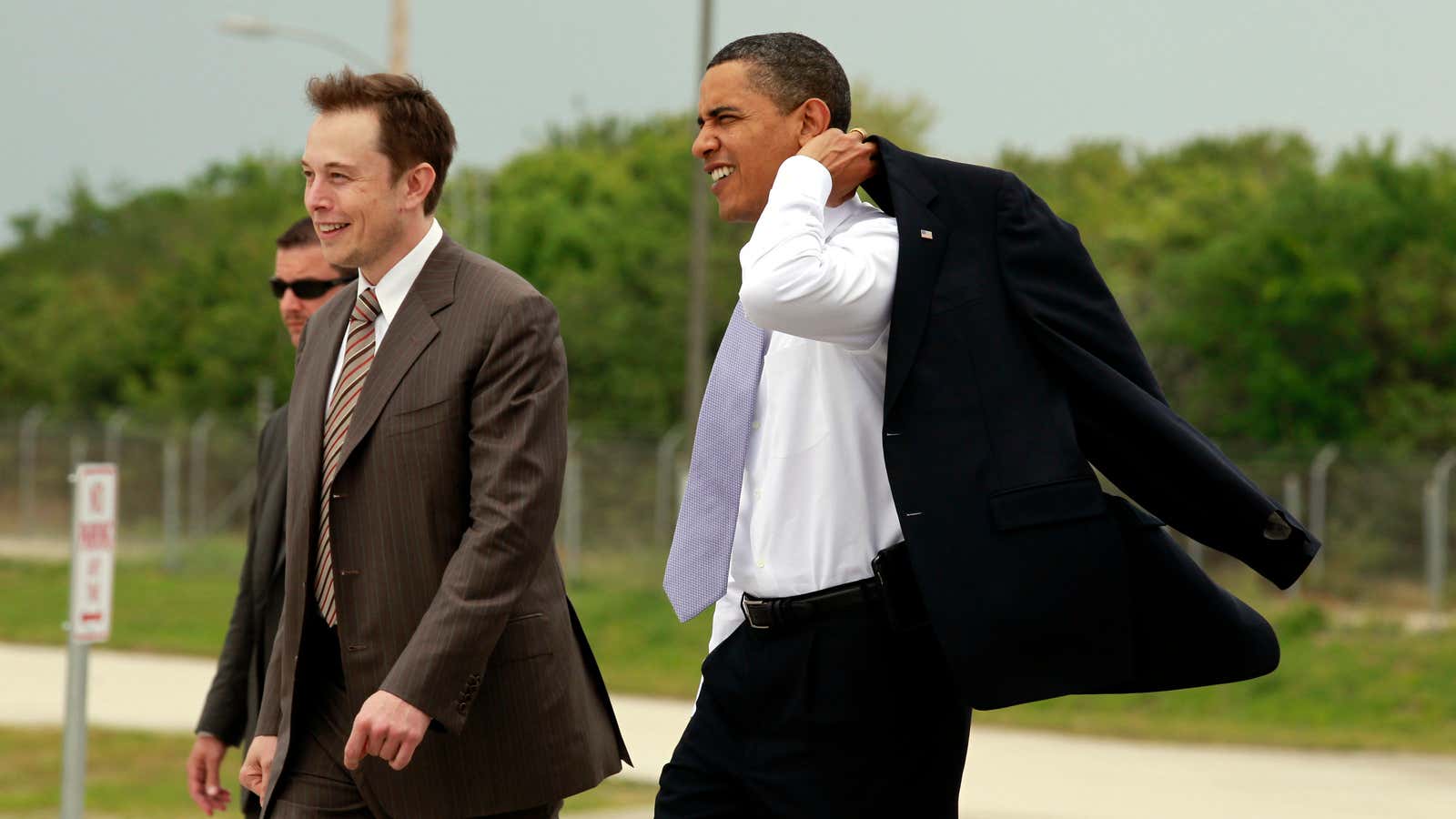Elon Musk relishes stirring the pot. Take his recent appearance on the Late Show and his suggestion—perhaps in jest, it’s hard to tell with Musk—that nuking Mars is a way to terraform the red planet and make it fit for human life.
But the CEO of SpaceX and Tesla doesn’t have much to say about who should have the keys to America’s nuclear weapons, even as candidates jockey to demonstrate the support of tech sector leaders. One of the candidates, Carly Fiorina, is a former technology executive herself.
And Musk, whose world-spanning ambitions lead his companies to frequent interaction with the public sector, surely has an interest in public policy decisions, whether related to SpaceX’s work as a major NASA contractor, the tax breaks that make Teslas cheaper, or utility regulations that affect SolarCity, where he is chairman of the board.
Giving the max
Campaign contribution disclosures this summer raised interest in Washington when they revealed that Musk had donated the maximum amount—$5,000—to former secretary of state Hillary Clinton’s presidential campaign, while Florida senator Marco Rubio refunded $2,600 to Musk; Musk had contributed to Rubio’s senate campaign but did not give his permission to shift the donation to Rubio’s presidential warchest.
Musk declined to discuss his political views, as did Clinton’s campaign; Rubio’s campaign did not return a request for comment. But Musk’s associates say these donations—negligible at the scale of the multi-billion dollar campaign—don’t indicate his preferences.
“Despite the contribution to Hillary Clinton, Elon has not committed to exclusively support any presidential candidate, Democrat or Republican, and he may not do so at any point during this election,” one person familiar with Musk’s giving told Quartz, adding that the Rubio refund occurred only after a paperwork snafu.
Indeed, further digging into Musk’s political giving since 2003 reveals a remarkable even-handedness, with the serial entrepreneur donating $258,350 to Democratic candidates and $261,300 to Republicans. Musk, like many executives, spreads his donations around; during the last election cycle, he gave money to both Democratic President Barack Obama and current Republican presidential candidate Senator Lindsey Graham.
In total, Musk has given $519,650 to US politicians since 2003. His donations fall somewhere in the middle range of comparable executives, such as Lockheed CEO Marillyn Hewson ($15,121.54), fellow Pay-Pal alumnus and SpaceX investor Peter Thiel ($5.1 million), fellow space entrepreneur and Amazon CEO Jeff Bezos ($180,000), Boeing CEO Dennis Muilenberg ($22,800), and GE CEO Mary Barra ($31,525).
Playing the Beltway game
Over the years, Musk’s companies have become more sophisticated players in Washington, but they remain far behind incumbent competitors in the aerospace and automotive industries when it comes to official PAC and lobbying expenditures. SpaceX’s official PAC has contributed $90,577 to candidates during the current election cycle, while Boeing’s donated $687,000.
But Musk—whose larger-than-life personality sometimes eclipses his companies—attracts more attention than the gigantic competitors, and politicians and pundits relish a chance to use Musk as a symbol of the best or worst of the tech sector has to offer, with little in between.
In the last presidential election, Republican presidential nominee Mitt Romney called Tesla a “loser” because it received development loans from the Department of Energy, which the company paid back in full. After Romney lost the election (and Tesla was was named MotorTrend’s 2012 Car of the Year), Musk suggested the former venture capitalist had gotten “the object, but not the subject,” of the remark correct.
In 2013, Musk backed out of FWD.us, the Silicon Valley group lobbying for expanded immigration to the US. Musk, a naturalized US citizen himself, supported the group’s agenda, but not the bare-knuckle tactics it used, including running ads in support of drilling for oil in the Alaskan National Wildlife Refuge to boost pro-immigration Republican lawmakers.
“Initially, I agreed to be a part of FWD.us because I agree with immigration reform,” Musk would later tell ReCode’s Kara Swisher. “But I think the methods that were employed—it was a little too Kissinger-esque, Realpolitik. … I think we should try to make things happen for the right reason. We shouldn’t give in to the politics. If we give in to that, we’ll get the political system we deserve.”
Hard to pigeonhole
Musk, a prolific tweeter, seems to be a bit gun-shy of expressing his political views. A comment memorializing former UK prime minister Margaret Thatcher after her death prompted criticism online, while another tweet arguing that carbon taxes would be the ideal way to subsidize clean energy, rather than direct government investment, prompted an article suggesting he embodies Silicon Valley’s “go-it-alone narrative.”
But Musk’s record and views suggest he is hardly the iconic Silicon Valley libertarian, like his friend and colleague Thiel. Musk may share a view, common in the business world, that government interference should be de minimus, but in practice he has proven himself a pragmatist. NASA’s partnership with SpaceX demonstrates this best, with both institutions working to create an outcome neither could accomplish on their own.
And the overarching concern behind all of Musk’s business endeavors—his fears about the impact of climate change on the future of the human race—are hardly the top priority of most libertarians. Consider the Hyperloop, a design for a pneumatic people transporter he proposed in 2013 as a replacement for California’s planned high-speed rail link between Los Angeles and San Francisco. Musk’s white paper offered what he considered a cheaper alternative to a technically unambitious mega-project likely to go well-over budget, but it also noted that “the underlying motive for a statewide mass transit system is a good one.”
Ultimately, Musk’s politics don’t fit neatly into the modern two-party system, which may be why so many of his fans are eager to hear his views. But those seeking to know the winner of the Musk primary will have just have to wait.
